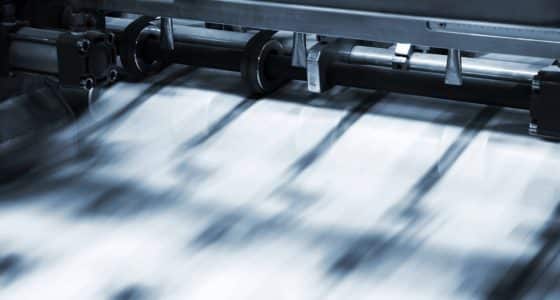Mesothelioma victim Raymond Desiena worked as a printing press operator from the 1960s to the 1980s. Before his death, he filed personal injury lawsuits against two printing press companies: he blamed them for exposing him to asbestos-containing parts in their equipment without providing him with warnings of the dangers that they posed. Though both companies filed motions to have the cases against them dismissed, Justice Adam Silvera of the Supreme Court of New York County denied their requests.

Printing Press Companies’ Affidavits Deemed Insufficient in Mesothelioma Case
According to Mr. Desiena’s claim, his mesothelioma was a result of exposure to friction brakes manufactured by Airflex, which were included in L3Harris Technologies Inc.’s printing presses, and asbestos contained in Heidelberg USA, Inc. printing presses. Both companies submitted affidavits from corporate representatives who indicated that their presses did not use the brakes or contain asbestos.
In review of the affidavits, Justice Adam Silvera noted that Harris’ corporate representative, George Karosas, did not establish that the company’s products could not have caused Mr. Desiena’s mesothelioma, and specifically that he had acknowledged that he had not become aware of the company’s presses until nearly two decades after the victim’s first exposure to asbestos through the equipment. Similarly, the Heidelberg representative, Shawn McDougall failed to establish that he hadn’t worked with the company’s presses, and similarly had no knowledge of them during the 1960s and early 1970s, when Mr. Desiena had worked with them.
Mesothelioma Victim’s Testimony Called “Clear and Unequivocal”
In contrast, the judge said that before his death from mesothelioma, Mr. Desiena had provided “clear and unequivocal testimony” regarding his exposure to both company’s printing presses, at various worksites and with significant and detailed specifics. Where the company’s attorneys had attempted to simplify his testimony as describing “dust,” the judge said that the victim had “clearly explained his extensive work experience, his familiarity with various printing press parts, and the brands that manufactured them, where and why and how many times he encountered such parts, and why he believed that they contained asbestos.”
The judge denied both companies’ motions to dismiss the mesothelioma victim’s claim and allowed the case to move forward for a jury to decide.
If you or someone you love has been diagnosed with malignant mesothelioma, the Patient Advocates at Mesothelioma.net can help. Contact us today at 1-800-692-8608.
